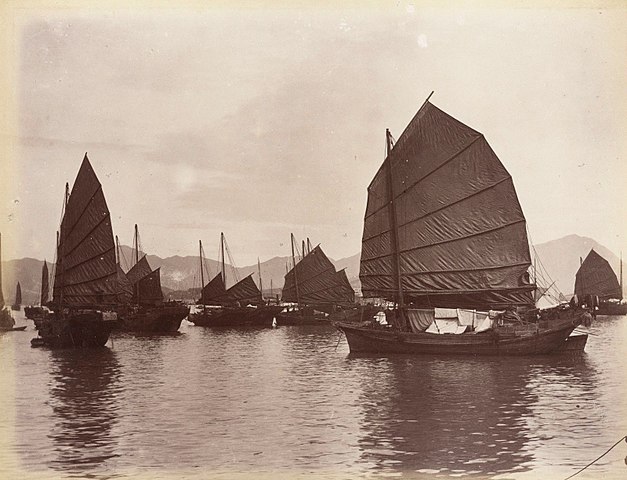Jenny Hall
Verses from the Dhammapada 251
“There is no fire like hatred, no rushing like craving.”
The Buddha taught the delusion of a separate self as the cause of human dissatisfaction. Being a delusion, and thus insubstantial, this lack gives rise to craving to fill the void. Hatred is 'my' attempt to protect myself from this truth.

Junks in Guangzhou, China by Lai Afong
A newspaper article recently suggested that many people are suffering burnout. They are so tired and stressed that even if they manage to fall asleep at night, they wake up in the morning unrefreshed. The article recommended changes in diet and exercise. However, a deeper look into the problem may be helpful. The Buddha taught that our true nature with which we are all naturally endowed is the Buddha nature (choiceness awareness). It is the life-force, boundless and tireless.
The Buddha also taught that ‘I’ is a delusion, at most a changing stream of thoughts and sensations. This delusion warps and wastes the precious energy of life for its own ends. It allows it to flare, or is stifled in order to constantly secure, pump up and keep the idea of ‘me’ afloat. Hatred and craving create ‘me’.
A woman was in our local newsagents with her two little boys. One was a toddler and the other a five-year-old. It was soon to be his birthday. The mother bought a huge balloon in the shape of the number six for a party. The toddler took one look at the balloon. He started to scream at the top of his voice, "I want to be six. Why can't I be six?"
The desire for self aggrandisement is revealed in the following: Master Obaku was standing on the banks of the Yellow River with the Chinese Emperor. The Emperor looked out across the water and admired all the ships crowding it. He pointed them out to Obaku as evidence of the greatness of his empire. But Master Obaku replied "I can only see two ships." The Emperor was amazed and said "What do you mean? The river is full of them.” The Master repeated "I can only see two ships, the ship of gain and the ship of fame.” This caused the Emperor to rethink his policies and as a result a new golden age was ushered in.
We are always trying to be someone, do something or get something for me. We also hate what we have judged as diminishing ‘me’. We squander energy in an attempt to separate ourselves from it.
For a couple of years, we have been sharing a garden with foxes. To begin with irritation would arise when every morning we woke to find holes in the hedges and trampled plants. Energy was expended repairing the damage and devising obstacles to prevent future visits. However, the foxes were undeterred. All our precautions failed. It was suddenly realised that all that we needed to do was to create a space at the bottom of the fence to allow the foxes in. With room to enter, the rest of the garden was protected and we were all able to enjoy it.
It is the hot, rushing energy behind my ‘must haves’ and ‘must get rid of’ that needs to be met and suffered, and the energy conserved. Once befriended and allowed to burn me away it is transformed into choiceness awareness – the Buddha nature.
Krishnamurti describes it as having no idea, no thought, no sense of direction or motion. In the following story, the man standing on the hill illustrates this.
Three travellers noticed a man standing on a high hill. They began to argue. One said "he's probably looking for one of his favourite animals." Another said "no, he's probably looking for a friend." The third said ‘’no, you're both wrong. He is enjoying the fresh air.” They continued to argue until they also arrived at the top of the hill. One of the travellers asked the man "have you lost a favourite animal?" The man replied "no." The next traveller asked "have you lost your friend?" The man replied "no." The third traveller asked "are you here to enjoy the fresh air?" The man again replied "no." The travellers then asked "well what are you doing then?" The man replied "I am just standing."
As we wholeheartedly give ourselves in the daily life practice into whatever is arising or being done, then I am emptied out like the man standing on the top of the hill. The Buddha nature takes over. All action becomes its expression free from me and all my efforts.
There is no desire to grasp or push away whatever arises because in the open heart there is nothing separate from the whole. There is nothing lacking. All action flows for the benefit of all. The warmth and joy are the energy out of which the whole world comes to be and ceases to be in each changing moment. It is inexhaustible. This is what The Zen training leads to. As Bodhidharma said:
"Directly pointing to the human heart,
Seeing into its nature and awakening."




































































